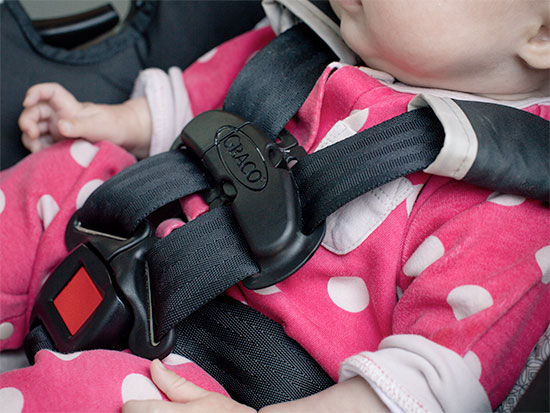 Past research has proved that child restraint systems can significantly reduce the risk of serious injury and death to infants and young children when installed correctly.Motor vehicle crashes kill an American child every three hours — more than any other cause — with rural children having a higher risk, according to the Centers for Disease Control. The University of Alabama at Birmingham, in collaboration with Safe Kids Worldwide, was awarded one of 11 Safe System Innovation Grants from the Road to Zero Coalition, managed by the National Safety Council. The $186,602 grant will support UAB College of Arts and Sciences research efforts focused on improving child restraint installation in rural America through an interactive, virtual presence.
Past research has proved that child restraint systems can significantly reduce the risk of serious injury and death to infants and young children when installed correctly.Motor vehicle crashes kill an American child every three hours — more than any other cause — with rural children having a higher risk, according to the Centers for Disease Control. The University of Alabama at Birmingham, in collaboration with Safe Kids Worldwide, was awarded one of 11 Safe System Innovation Grants from the Road to Zero Coalition, managed by the National Safety Council. The $186,602 grant will support UAB College of Arts and Sciences research efforts focused on improving child restraint installation in rural America through an interactive, virtual presence.
“Past research has proved that child restraint systems can significantly reduce the risk of serious injury and death to infants and young children when installed correctly,” said David Schwebel, Ph.D., principal investigator and director of the UAB Youth Safety Lab. “Our goal in the study is to implement and evaluate virtual training technology that will inform and train parents in rural communities on how to properly install child restraint systems in their cars.”
Safe Kids Worldwide has a nationwide network of trained technicians currently assisting parents in achieving correct child restraint use through scheduled “car seat checks,” where technicians work one-on-one with parents to install restraints. These car seat checks have effectively reduced errors in restraint installation. However, those in rural communities are not using these services due to barriers to access, scheduling complications and insufficient resources to staff consumer demand for car seat checks.
The grant will help implement and evaluate the use of interactive virtual presence technology to remotely assist parents living in rural Montana in installing child restraints properly into their vehicles.
| “If effective, this technology could reach all Americans, including those living in rural areas, and supplement or replace car seat checks to significantly reduce errors made in child restraint installations.” |
“If effective, this technology could reach all Americans, including those living in rural areas, and supplement or replace car seat checks to significantly reduce errors made in child restraint installations,” Schwebel said. “The results of this trial could help create a center dedicated to remote car seat installation advice, like that of the poison control centers. These centers would have centralized offices staffed by certified technicians to help parents install child restraints remotely.”
The study will look at 150 parents in rural south-central Montana and evaluate their behaviors, attitudes and perceptions about child safety and restraints, while an on-site technician evaluates baseline safety of the restraint. Parents will then engage remotely using their smartphone with an off-site certified car seat technician, where they will obtain advice on installing the child restraint properly. The on-site technician will inspect the restraint again using the validated checklist and correct any errors before the parent leaves. In doing so, the study hopes to demonstrate that the technology is effective, safe and accurate.
“Our children are our most precious cargo, and it is critical that we protect them,” said Deborah A.P. Hersman, president and CEO of the National Safety Council. “UAB has a proven track record of implementing life-saving strategies to keep our child passengers out of harm’s way, and the Safe System Innovation Grant will help advance their critical work.”
Road to Zero has awarded $1.5 million in grants over the past two years to organizations with innovative approaches to make roadways safer and eliminate preventable roadway deaths. To qualify for a Safe System Innovation Grant, an organization must clearly explain how its program will improve safety on the roadways, set a timeframe for the reduction, outline how the program will be evaluated and detail how the organization intends to reach its target audience, among other elements.
The Road to Zero initiative was launched in October 2016 as a joint effort between the National Highway Traffic Safety Administration, the Federal Highway Administration, the Federal Motor Carrier Safety Administration and NSC. The goal is to eliminate roadway deaths by 2050. The National Highway Traffic Safety Administration at the Department of Transportation committed $3 million-$1 million annually from 2017-2019 to fund Safe System Innovation Grants, and NSC is managing the grant process.